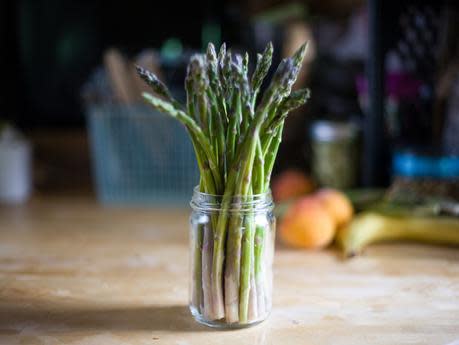How to Store 10 Foods So They'll Last Longer

Keep your food longer with these 10 easy tips. (Photo: Sarah Palmer/Moment/Getty Images)
Have you ever opened a crisper drawer to find wilting herbs, soggy onions or a lifeless tomato? Tossed out sprouted potatoes, rancid flax meal, dried-up garlic or suspicious eggs? If so, you’re not alone. The average American throws away nearly 20 pounds of food per person every month, according to a 2012 report from the National Resources Defense Council – that’s like dumping $165 billion dollars into a landfill. Here are easy tips on how to store 10 common foods to make them last longer AND save you money.
1. Asparagus
According to the Michigan Asparagus Advisory Board, asparagus should be stored “clean, cold and covered.” For best results, trim a quarter-inch from the stem, wash thoroughly, pat dry and store – stems down – in a jar filled with two inches of cold water. The Advisory Board recommends consuming within two to three days of storing.
2. Eggs
Ignore the adorable egg tray in the refrigerator door. Instead, stick the carton where the sun don’t shine (as in the middle or lower shelf). Keep raw eggs in the coldest part of the refrigerator, not in the door where temperature fluctuations can decrease their quality.
Related: 11 Food-Safety Mistakes You Don’t Know You’re Making
3. Potatoes
Potatoes like it dark and cozy, so keep them in a perforated plastic or paper bag in a dark corner of the kitchen. Avoid temperature extremes. Heat (think under the kitchen sink or in front of a window) encourages sprouting, while the cold refrigerator rapidly turns starches into sugar, resulting in a discolored, sweet-flavored spud.
4. Olive Oil
Buy olive oil in dark glass bottles and store in a cool, dark place like a cabinet or pantry, recommends the American Olive Oil Producers Association. Don’t put olive oil in the refrigerator. You’ll risk condensation – water droplets forming inside the bottle – that can change the flavor. Unopened and stored properly, olive oil can stay fresh for up to two years from the date bottled, says the AOOPA. Once opened, consume within a few months.
5. Berries
Refrigerate berries – unwashed – in their original containers. Rinse gently in cold water right before eating. On a side note – you can easily freeze fresh berries to enjoy them all year long. Gently rinse berries (except blueberries) in cool water, let them dry completely, and stow in sealed containers. Driscoll’s recommends not washing blueberries before freezing because it can toughen their skins. Instead, thaw and wash before using.
6. Tomatoes
Close the refrigerator door and slowly step away. You’re ruining your tomatoes. Cold temperatures destroy their flavor and keep tomatoes from ripening to peak deliciousness. The Florida Tomato Committee recommends placing them with the stem up on the counter at room temperature. If they’re not ripe enough, they’ll just need a day or two (no more than five) to turn a rich, ripe red.
Related: 7 Clever Kitchen Hacks to Simplify Your Life
7. Onions
The experts at the National Onion Association recommend storing whole onion bulbs in a cool, dry, dark place with good air circulation. In other words, don’t keep onions in plastic bags, in front of a window or in the refrigerator. Exceptions: Sweet or mild onions can be refrigerated to extend shelf life as long as they’re in a low-humidity drawer. Once peeled, onions should be refrigerated.
8. Avocados
Unripe, firm avocados will ripen on the counter at room temperature (it may take four to five days). Don’t put them in the refrigerator, which can slow the ripening process, advises the Hass Avocado Board. To speed ripening, place avocados in a paper bag with a banana or apple; these fruits produce ethylene gas, a natural ripening agent. Once cut, sprinkle the fruit with lime or lemon juice or coat lightly in oil and refrigerate in an airtight container for up to a day.
9. Whole-Grain Flour
Whole-grain flours are more susceptible to oxidation than intact whole grains because more of the surface area of the grain is exposed to heat, air and moisture – whole-grain flours’ greatest enemies, according to Katie Walker, spokesperson for King Arthur Flour. To keep flour fresh, King Arthur Flour recommends storing all whole-wheat and alternative flours (think spelt, quinoa, millet, amaranth and rye) in airtight containers in the freezer. “If the freezer is too full, the refrigerator is better than nothing,” Walker adds.
Whole-grain flour will last for three months in the pantry after opening, six months in the refrigerator and longer in the freezer. When in doubt, trust your nose. “Flour should have a faint, sweet smell or no aroma at all. If a musty or oily scent is detected, then the flour has passed its peak,” says Walker.
10. Nuts
Nuts are naturally oily, which is great for their flavor and heart-health benefits, but bad for their longevity. Oil eventually turns rancid, and spoiled nuts take on a bitter, sharp and overall gross flavor. Fortunately, cold temperatures can delay their demise. Once in the refrigerator in an airtight container, nuts last for about a year.
Click here to get five more tips on how to store food properly!
By Caroline Kaufman, MS, RDN
More from LIVESTRONG.COM:
Is MSG (Monosodium Glutamate) Misunderstood?
